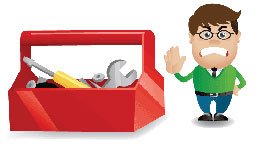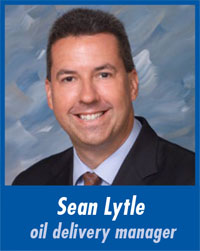
Dear Friends,
We talk a lot about the importance of great service. A huge part of that is safety for your home and property, for our staff, and for the environment.
It starts with our product. Heating oil is exceptionally stable and safe. It cannot explode — even if you drop a lit match into it. Heating oil is also much safer in the case of a carbon monoxide leak, because you will get a warning sign about a malfunction — unlike with natural gas. In addition, the B20 Bioheat® fuel we deliver is better for the environment, because it burns more cleanly, with fewer emissions, while producing more BTUs of heat.
Our staff is highly trained, ensuring careful handling and storage and protection against spills, accidents and injuries. Our storage terminal meets or exceeds state and federal safety guidelines. Our team is dedicated to embracing the latest technologies and best practices in order to maintain the highest standards for environmental health and safety for Westmore employees, our partners, suppliers and of course our customers.
This end-to-end commitment to safety can’t be duplicated by the natural gas utilities. Problems with gas pipelines can often go undetected, and may result in property damage and even fatalities, as we saw in Massachusetts a few months ago.
Safety is a big part of the package you get with Westmore. We believe that when you understand how we go about our business, you’ll feel even better about being a Westmore customer.
Warmly,
Richard C. Bologna

Westmore customer Lisa Z. woke up to the coldest Thanksgiving morning in 100 years — and her heat had stopped working!
“We called the emergency number and spoke to a very nice woman who told us a technician would be calling us,” Lisa says. “In less than five minutes, the tech called. He said he could be at our home in 20 minutes, and arrived in less time.
“Once he looked at the system, he knew what was wrong, and he fixed it in a short time. We originally thought we might have to cancel our Thanksgiving plans, but the service was so quick and efficient, we were soon on our way.
“Thank you, Westmore, for living up to your promises! We could not have asked for better service. We are thankful for so much, and that includes being a Westmore Fuel customer.”
If you like the service you get from us, tell your friends, neighbors and co-workers. They’ll thank you — and we’ll thank you with a $100 credit to your account.*
It’s easy: Just call us or fill in the form online here and we’ll take care of the rest.
* Some conditions apply. Call for details.
Being safe at home becomes a lot easier when you rely on oil heat — and us! To keep you even safer this season, we offer some advice.
During power outages, we receive many calls from customers who have fuel but can’t get heat. Unfortunately, your heating system will not run without electricity — no matter whether your fuel is heating oil, natural gas, propane or, obviously, electricity. (Only some very old heating systems can operate without power).

If your home is without power for an extended period of time, unplug appliances and turn off circuit breakers. This will prevent surges when the electricity returns. Before restarting your system, check that the system’s power switch and circuit breakers are back on. Do not press your unit’s reset button more than once.
Once you have power back, make sure that there is no standing water in your basement. If your system requires service to get it started again, for safety reasons it cannot be worked on when water is pooling around it.
If flood water reached your heating system, call us to do an inspection before you restart it. The valves and controls are vulnerable to water damage — even if it cannot be seen. Corrosion begins inside the valves, and damage may not be apparent when the outside is clean and dry.
In this digital age, the initial response to solving a problem is to go online and do research. That’s why do-it-yourself (DIY) projects are such a big trend these days. It seems as though people of all ages and skill levels are checking out YouTube videos for a quick-fix way to heal whatever ails their home.

But what those videos usually don’t show is what happens when that amateur repair doesn’t go as planned. Over the years, we’ve seen some costly — and even dangerous — consequences. That’s especially true when someone starts fiddling around with complicated heating systems.
Repairing a heating system presents unique challenges that more often than not require extensive training and expensive diagnostic equipment to assess and fix.
The bottom line: If you need a heating system repair, don’t attempt to do it yourself — call us. Our certified technicians have the training, experience and tools to find and fix your problem quickly, correctly and safely so you can focus on the things that matter in your life — like having fun with your family.
If you’ve gone away on a winter vacation in the past, you know how important it is to have someone check your home on a regular basis. That person can contact us if there’s a problem and give us access. (You may also want to consider a lockbox.) But you can do more.

You can add a temperature sensor to your home’s central alarm system. Another option is to install a wireless remote smart thermostat. Once you register the thermostat online, you can use your phone to access it from any location to monitor or adjust the temperature. Some models will even send out an immediate alert if the heat stops and the temperature falls below a certain point.
For added protection, we recommend our automatic delivery service to eliminate the chance of your tank going dry while you’re away. If you already receive your deliveries automatically, please let us know when you’ll be away so we can adjust your “burn rate.”
Lastly, remember to keep your home temperature no lower than the 60°–65° range to reduce the risk of frozen pipes. During extreme cold spells, we recommend setting the thermostat a little higher than that.
With more people relying on both portable and permanent generators than ever before, it’s important to share the following emergency generator safety tips:


When you’re shopping for a new boiler, don’t let the Energy Star rating be your only guide. These efficiency ratings can be a good general starting point, but it’s important to remember that the tests they are based on are all done in a laboratory. Efficiency performance is only as good as your installer.
Our experts are trained to ask the right questions and to understand your home, and that means they can make sure you choose the right size and the right type of equipment. Ensuring that you stay warm and comfortable while saving money is our goal. We keep up to date on the latest technology and understand how it performs, so we can install it to the manufacturer’s specifications, and you can get the best performance and value for your investment.
If you’re ready to replace your heating system, give us a call or contact us through our website.

Q: What’s going on with this ultra-low-sulfur oil mandate?
A: If you live in New York State, the ultra-low-sulfur heating oil requirement has been the rule for you for years, but now Connecticut has caught up. Westmore has been delivering clean-burning, ultra-low-sulfur B20 Bioheat® blend for almost a decade, so our customers have been enjoying the benefits of this renewable fuel for a long time.
Q: What exactly are the benefits?
A: In addition to reduced emissions, cleaner-burning fuels are kinder to your equipment. There’s less sediment, fewer clogs and far fewer breakdowns. Your system burns fuel more efficiently, so you’ll get better value — and if you use super-efficient heating equipment, your savings will be even better.
Q: Do you charge more for B20 Bioheat?
A: No. We deliver it at no extra cost, because it’s better for everyone. In fact, New York customers get a tax rebate for using it.
Q: Is this the same fuel that other companies are delivering?
A: No. Westmore is the only fuel company in this area that delivers B20 Bioheat. Other companies at best use only a 2% or 5% blend of biodiesel. Because of our higher blend, B20 Bioheat burns more cleanly than natural gas.

Customers in New York: Remember that you’re eligible for a tax rebate of 20¢ per gallon because we deliver B20 Bioheat. In January, you will receive a letter explaining what you are eligible for, along with the tax rebate form.